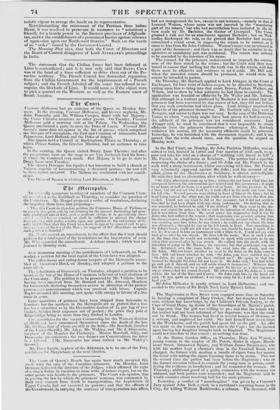The Court of Queen's Bench has again been much occupied
this week with the case of the Canadian prisoners. On Monday, Lord Denman delivered the decision of the Judges, which affirmed the right of a single J udge in vacation to issue writs of habeas corpus, but on the other points was hostile to the prisoners. The Court was opinion, that in passing the law by which the prisoners' sentence was commuted by their own consent from death to transportation, the Legislature of Upper Canada, had not exceeded its powers ; and that the officers of the Government, in carrying the sentence of transportation into effect, had not transgressed the law, except in one instance,—namely in that of Leonard Watson, whose name was not inserted in the "mandatory part:Of the return," but who had nevertheless been included in the re- turn made by Mr. Bachelor, the Gaoler of Liverpool. The Court granted a rule nisi for an attachment against Bachelor ; but on Wed- nesday discharged the rule, on the ground that Bachelor had merely committed a venial error, in supposing the return to be correct, as it came to him from Sir John Colborne. Watson's name was mentioned in a part of the document ; and there was no doubt that its omission in tlie operative or mandatory part was accidental. The return was ordered to be amended by the insertion of his name.
The counsel for the prisoners endeavoured to impeach the correct. ness of the facts stated in the return ; but the Court said they were bound to assume that nothing but the truth was in the return, and that there must be affidavits and evidence to set it aside. Mr. Hill said, when the amended return should be produced, he would state the course he intended to pursue.
On Thursday, Mr. Roebuck applied to Lord Abinger, in the Court of Exchequer, for four writs of habeas corpus, to be directed to Bachelor, calling upon him to bring into that court, Brown, Parker, Walker, and Wilson, and to show by what authority he had them in custody: The application was founded on affidavits by Mr. Wailer and Mr. Ashurst, that although in a warrant produced by Bachelor it was stated that the prisoners had been convicted by due course of law, they did not believe that any such conviction had taken place. Lord Abinger required the affidavits of the prisoners themselves. Mr. Roebuck said, they were in Newgate, and access to them was not easy. In the case of the Hottentot Venus, to whom " anybody might have had access for half-a-crown," the affidavit of the prisoner was not considered necessary. Lord Abinger said, he must be convinced that it was impossible to obtain affidavits front the prisoners themselves: whereupon Mr. Roebuck withdrew his motion, till the necessary affidavits could be procured. Yesterday, he was furnished with the documents required ; and it was agreed that the writs should issue, and the question be argued on Monday next.


























 Previous page
Previous page